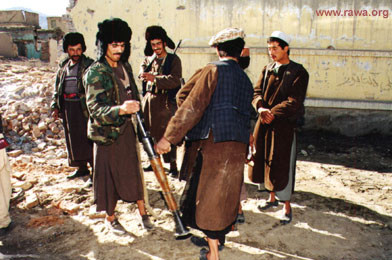By Noor Wali Saeed Shinwarai
Mohammad Hasan says he had a good life before the breakout of war in the nineties. The fighting between mujahedin factions rendered him a pauper. Two decades have passed, he has not recovered. A testimony*
Before the war, Hasan, 67, was a motor mechanic in a village near Ghazni. "I was a popular mechanic, and I had a good life. I had 80 barrels of oil in my shop. I had a truck," he says with great pride. But then the war came, and Hasan removed the tires from his truck, and tried to make it look like a junk.
One day gunmen came to his shop, beat him up till he put the tires back, and drove off in his truck piled high with everything Hasan owned.
"They left me with just the clothes I was wearing. They took away whatever I had including money, and the old truck," he says, shaking his head sadly.
Hasan borrowed some money from people, and left with his family for Kabul Dehbori. "I was an indigent in Kabul," he recalls. "I was remorseful about leaving the village. People took pity on us, and donated some pots in charity."
Hasan calls the nineties a time of trouble for even the rich in their palaces. Life was like sipping from a poisoned chalice, he says. The poor saw death as a release, he adds.
Burying the dead
In Kabul, Hasan and his family sheltered in a mosque. Then he found a house in Dasht Barchi, but it was close to a mujahedin gun post targeted by rival fighters. "A rocket came down on a nearby house, and killed seven people. One of them had married only 10 days back," he says.
A barrage of rockets one day hit the gun post, and had people cowering for their lives. Hasan, who had already lost so much in the war, decided to dig graves for nine gunmen who were killed in the post. Just as he was finishing, some people came running to him with bad news. "A rocket had come down on our house. When I got there my 22-year-old son was dead," he says gruffly, trying to hide his grief. The tenth grave he dug that sad day was for his son.

Criminal jehadi forces of Abdul Rashid Dostum in Kabul, 1994. They were best known for looting the property of people in addition to other crimes. (Photo: RAWA.org)
More Photos
Everywhere that night, in the cover of darkness, people dug graves and washed bodies, preparing the dead for burial. Five people had died in Hasan's neighbour's house.
Hasan says he found a mullah who agreed to a mass funeral. All the bodies were brought to the graveyard. But just then there was another round of rockets, and people fled including the cleric.
"I remained alone among the bodies," says Hasan. "At midnight I knocked on some doors and found three other people and together we buried the bodies," he adds with a sense of resignation.
But sadness was not through with Hasan that night. When he got home his wife told him their daughter Nilofar had been badly injured and taken to hospital by neighbours.
A distraught Hasan was told by the same neighbours that doctors at the hospital told them Nilofar had lost a lot of blood and should be admitted to the better equipped ICRC Hospital. The doctors at ICRC told them to leave her at the hospital, and go home.
Hasan says the news left him limp. But the war outside his window was not about to stop. By the next morning, the rocket attack had intensified. An explosion close by had Hasan climbing up to the roof of his house to see who had got hit. His neighbour's house was in flames, but fortunately no one was killed, he says.
Tired of life
What happened next is a blur in Hasan's head. A piece of rocket pierced Hasan's arm. "There was blood pouring out of my arm. People screamed, told me to climb down. But I fainted, and fell from the roof to the street below," he says.
With great difficulty Hasan was taken to the Wazir Akbar Khan Hospital. He was in hospital for two months, and eventually recovered except for the use of his right hand. But his daughter was never able to walk again.
"She is alive but does not leave the house. She cries all the time," he says.
Hasan has not been able to reconcile with his present. He wants to see the gunmen of the Kabul war (between 1992 and 1996) punished. He is certain punishment waits them in the court of God.
"I am tired of life, I was not poor like I am now," he repeats.
He has found work as a poorly-paid watchman, staying awake all night to earn bread for his family.
"I am a victim of war," he says very bitterly. "I guard other people's houses like I was a beggar. It is the war that has made me poor."
** The testimonies of survivors of war crimes are our contribution to creating greater public awareness about people's hopes and claims for justice, reconciliation and peace. These life stories are distributed internationally by the news agency IPS-Inter Press Service and are the basis for a radio drama that is being broadcast by seven Killid radios.



